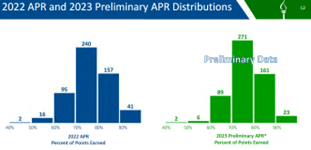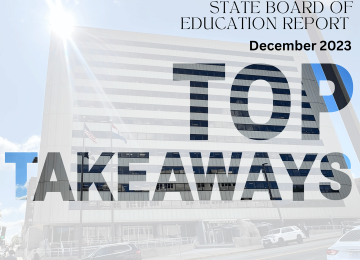1. State Board of Education Announces Dr. Karla Eslinger as Next Missouri Commissioner of DESE
 Dr. Karla Eslinger, currently a Missouri Senator for District 33, will not be seeking reelection following the 2024 Legislative Session so that she can assume the role as the state’s next commissioner for DESE effective June 1, 2024. Dr. Eslinger has an extensive background in Missouri Education as a teacher, principal, district-level administrator, superintendent, Assistant Commissioner for DESE, and representative for the U.S. Department of Education.
Dr. Karla Eslinger, currently a Missouri Senator for District 33, will not be seeking reelection following the 2024 Legislative Session so that she can assume the role as the state’s next commissioner for DESE effective June 1, 2024. Dr. Eslinger has an extensive background in Missouri Education as a teacher, principal, district-level administrator, superintendent, Assistant Commissioner for DESE, and representative for the U.S. Department of Education.
MNEA President, Phil Murray, issued a statement following her appointment that recognizes her extensive educational and political experiences and her future collaborations with MNEA and all stakeholders “to overcome challenges and ensure every Missouri student has access to highly qualified and caring educators.”
2. Fewer Number of First-Year Teachers in Missouri Come from a Missouri Educator Preparation Program
Recent data from the Office of Educator Quality at DESE shows that only 46.5% of all 2022-2023 Missouri First-Year Teachers completed a Missouri Educator Preparation Program (EPP). For the same year, only 58% of first-year teachers in Early Childhood and Elementary (Birth-3), completed a Missouri EPP. The other avenues that these first-year teachers came from include substitutes with no teaching certification, temporary authorization certifications, provisional certifications, ABCTE certification, and out-of-state transfers. Further, when looking at the number of student teachers in the state, 24.5% of these student teachers were the teacher of record.
These numbers are significant as they represent the minimal authority that DESE, the State Board, and other councils made up of educators have over the quality of first-year educators’ preparation and support. This startling statistic and other data points, come from various indicators for the Annual Performance Report (APR) for Educator Preparation Programs (EPP) (APR-EPP) and the First-Year Educator Survey that DESE distributes and reports out.
The 2022-2023 First-Year Teacher numbers not only reflect Missouri’s teacher shortage but the consequences that come with it. The Office of Educator Quality is currently collecting data regarding the retention among some of these groups from 2017-2018 and will report further retention data to the board at a later date.
MNEA’s believes that the traditional route for certification–Teacher Preparation (D-3) and Student Teaching (D-4)–are “the more rigorous foundation and field experience” available for teachers. “Alternative routes to certification must not be based solely upon performance on a written test. Such routes must include professional teacher preparation and mentoring. American Board for the Certification of Teacher Excellence (ABCTE) as a means for certification should be rejected” (G-8).
3. Report Reveals 27 Recommendations for Missouri Schools for the Severely Disabled (MSSD)
DESE secured a contract with a third-party analysis company–Public Consulting Group–to ensure that Missouri is providing the appropriate services to 720 severely disabled students in 34 schools located throughout the state. MSSD is unique to Missouri in terms of how MSSD is structured; most states in the country use a state approval process for non-public schools to support students with significant disabilities. The report outlines 27 recommendations divided into six categories–General, School Condition, Facilities Maintenance, Safety and Security, Educational Adequacy, and Finance and Business.
4. Annual Report on the Missouri Course Access and Virtual School Program (MOCAP)
The Office of Quality Schools presented the 4th annual report of Missouri Course Access and Virtual School Programs (MOCAP).
Recent changes to MOCAP since 2022 include:
- 7,160 Full-Time Students (+3,329)
- 1,974 Authorized Courses (+318)
- 58,810 Course Enrollments (+32,558)
- 18 Authorized Providers (+4)
- 85% Completion Rate (+4%)
- 86% Combined Passing Rate (+12%)
Despite increases in enrollments, completion rates, and passing rates, MAP Data for these courses revealed that most virtual achievement scores remain lower than those of students in the traditional setting.
Missouri NEA believes that “quality virtual/distance education can create or extend learning opportunities but is not a replacement for traditional education” (A-7).
5. Update of MSIP 6 Annual Performance Report (APR) Release & 2023 District Classification Under MSIP 6
 Preliminary MSIP 6 APR data was reviewed by the State Board. Per 161.855.4, RSMo, classifications of districts will not be lowered due to performance until 2024. Scoring measures for the 2023 APR do not include all MSIP 6 Indicators and Performance Scores. Advanced release of APR data will be securely delivered to Local Education Agencies (LEAs) and the media on December 11-13, before the publicly available data on December 18.
Preliminary MSIP 6 APR data was reviewed by the State Board. Per 161.855.4, RSMo, classifications of districts will not be lowered due to performance until 2024. Scoring measures for the 2023 APR do not include all MSIP 6 Indicators and Performance Scores. Advanced release of APR data will be securely delivered to Local Education Agencies (LEAs) and the media on December 11-13, before the publicly available data on December 18.
A preview of the preliminary data, APR Distribution was provided and DESE stated that the 2023 APR should not be used to draw conclusions without considering the context of districts.
“The Association further believes that a high-quality structure of accountability functions best when it is separate from high-stakes testing and accreditation. A separate structure of accountability encourages schools to focus on improvement” (A-4).
6. Consideration of Approval of Charter School Application for Believe STL Academy
The State Board once again approved the Believe STL Academy Charter School application for North St. Louis within the boundaries of the St. Louis Public School District. This application was approved in October 2023, by the State Board but Believe STL Academy had to resubmit their application after the St. Louis Public Schools board sued the charter school upon grounds that the charter school failed to notify the district of intentions to open in fall of 2024.
Missouri NEA is committed to rigorous learning standards, decentralized and shared decision-making, diverse educational offerings, and the removal of restrictive requirements within the public schools. Charter schools serve students and the public interest when they are authorized and held accountable by the locally elected school board (A-6).
MNEA believes that every student and educator deserves the best experience possible in schools. That is why we are the only educational organization that is consistently present at every meeting of DESE, the state board of education, and the Missouri Legislature. We are your eyes and ears where decisions are being made about your schools when you cannot be.
The next meeting of the Missouri State Board of Education will be held on January 9, 2024, at DESE in Jefferson City, Missouri. If you have any questions or suggestions, please contact Samantha Hayes at 800-392-0236 or Samantha.Hayes@mnea.org.
The monthly State Board Report is also available in Podcast form at MNEA Connects. Listen on Amazon Music, Apple Podcast, Podbean, or Spotify.


